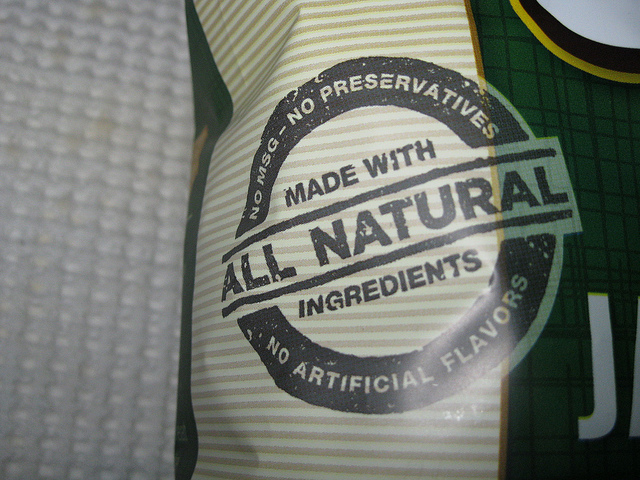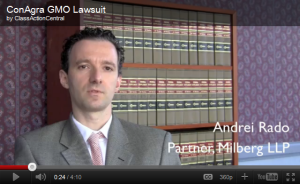The Supreme Court’s decision not to hear the case means that the Farmers case will not be reinstated nor decided on its merits and the decisions from the Court of Appeals stands.
|
|
|||
|
The appeals court in the Osgata matter held that Monsanto is legally bound not to sue farmers or sellers of seeds that are inadvertently contaminated with up to one percent of seeds carrying Monsanto’s patented traits. In a case of national prominence, farmers, seed selling businesses and agricultural organizations are fighting for their right to seek legal protection from accusations of patent infringement by the agri-giant Monsanto should they become contaminated by Monsanto’s GMO seed. Food and supplement makers complain they are under siege all the while making deceptive health claims and doing little to improve nutrition. The Center for Science in the Public Interest has been behind many of the lawsuits over unsubstantiated and misleading labeling. A judge recently ordered Fish and Wildlife Services to halt the planting of genetically engineered crops on the national wildlife land in the Southeast Region. Similar result eluded environmental groups in a related lawsuit over GMO use on refuge lands in the Midwest Region. Truth in labeling lawsuits are gaining prominence as increasingly consumers are taking giant food companies to task about their potentially misleading food labels. Accused of selling toxic bird seed for years and then covering up its use of unregistered pesticides, Scotts Miracle-Gro settled criminal and civil charges by agreeing to record-breaking penalties. The recent Minnessota Supreme Court decision raised quite a few eyebrows and we look closely at the legal issues associated with pesticide drift and this case. Not a mere hypothetical disagreement. The OSGATA lawsuit against Monsanto moved forward, despite the lower court dismissal, as more scholars and organizations echo concerns over GMO contamination and onerous lawsuits. Nearly 35 years ago, the Food and Drug Administration initiated proceedings to withdraw the approval of the subtherapeutic use of certain antibiotics in agricultural animals but it took a Court Order to force the agency to follow through. Organic and conventional family farmers, small and family-owned seed companies, and agricultural organizations recently filed an appeal in the case of OSGATA et al v. Monsanto, which was dismissed by a Federal Court in New York on February 24, 2012. The Federal District Court in New York dismissed the organic and conventional farmers’ complaint against Monsanto. But despite the legal loss, the lawsuit leaves a beneficial legacy. All Natural chips made by Frito-Lay may not be so natural after all, says a new lawsuit alleging that the snack-maker is misleading consumers with its all natural claims when in fact the products are made from genetically modified ingredients. Monsanto’s stronghold over seed patents was reinforced recently when an appeals court affirmed a prior ruling against a farmer, this time for buying seeds as “commodity” seeds from a local grain elevator. Faced with another government agency’s failure to follow the laws, advocate groups had to resort to the courts yet again, making the judicial system the last stopgap for even the most sensible environmental policy. The recent lawsuit against ConAgra Foods challenges the “pure” and “100% natural” labeling on the popular line of Wesson cooking oils allegedly made with genetically modified corn and soybeans. Watch this discussion about the nature of the suit. Farmers and agricultural organizations demanded their right to be heard after Monsanto asked the court to dismiss the lawsuit challenging the company’s aggressive enforcement of genetically modified seed patents. Monsanto is forced to backtrack on a lawsuit alleging that two Erie area farmers saved patented seeds. We look at that and, also, the latest on Anonymous hacking attack against Monsanto Two class action suits challenge the “pure” and “100% natural” labeling of ConAgra’s line of Wesson cooking oils. Can something genetically modified be also natural and pure? “Society stands on the precipice of forever being bound to transgenic agriculture and transgenic food” reads the first sentence in the amended complaint filed by farmers, environmentalist, researchers and consumer groups against Monsanto. New plaintiffs strengthen the resolve to stand up to Big M. Lawsuit by organic groups asks Federal court to invalidate Monsanto’s patents and to end Monsanto’s practice of suing farmers over GMO contamination. Conventional and organic farmers and environmental groups filed a lawsuit challenging the USDA’s decision to permit the unrestricted commercial release of genetically engineered alfalfa. A California Appeals Court reversed a lower court’s ruling which would have required the destruction of genetically modified sugar beet seedlings planted in September 2010. A Federal Court ordered the removal of genetically modified beet seedlings. After USDA and Monsanto appealed, the Ninth Circuit Court of Appeals is delaying the removal until a hearing that was rescheduled for February. |
|||
|
 |
|||













